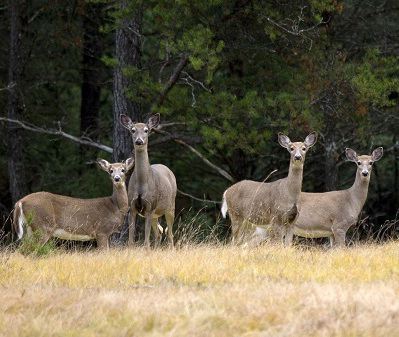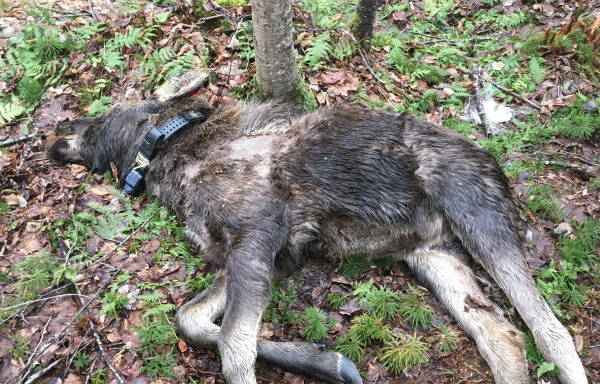Michigan DNR lauds partners in continuing battle against chronic wasting disease
GW: Don’t forget to report road-killed deer in the CWD management area. The DNR will pick them up for testing.
Deer suspected positive for CWD found in Watertown Township; Jan. 12 public meeting set
With deer hunting seasons coming to a close, the Michigan Department of Natural Resources wants to thank the important partners who have emerged in the ongoing fight against chronic wasting disease (CWD) – a neurological disease always fatal once contracted by deer, elk or moose.
Earlier this year, Michigan’s first case of CWD in free-ranging white-tailed deer was confirmed in Meridian Township in Ingham County.
 Since May, nearly 4,000 deer have been tested for CWD. Of those deer, four have been confirmed positive for the disease in Clinton and Ingham counties. One new suspected CWD-positive deer was found recently in Clinton County.
Since May, nearly 4,000 deer have been tested for CWD. Of those deer, four have been confirmed positive for the disease in Clinton and Ingham counties. One new suspected CWD-positive deer was found recently in Clinton County.
Although discovering CWD in Michigan’s wild deer herd was something wildlife officials had hoped to avoid, DNR deer program managers are pleased with the cooperation and commitment that have made surveillance of CWD more productive.
“From the individual who reported the initial sick deer, to U.S. Department of Agriculture Wildlife Services doing targeted surveillance, to the hunters who complied with regulations and checked their harvested deer, to the township officials who have supported DNR efforts – they are all important pieces to hopefully eradicating this disease in Michigan,” said Chad Stewart, DNR deer, moose and elk management specialist.
The latest suspected CWD-positive deer was located in Watertown Township, a new location for CWD in Michigan.
The DNR is trying to inform individuals near that area of the critical role they can play.
“An archery hunter brought his deer from Watertown Township into a DNR check station to have it aged and receive a successful hunter patch. He wasn’t going to have it tested,” Stewart said. “We suggested that he test just in case. If he hadn’t agreed, we may not have found another suspect.”
To inform area residents about what this most recent finding of the disease may mean for them, the DNR has scheduled a town hall meeting from 6 to 8 p.m., Tuesday, Jan. 12 in the DeWitt Charter Township Valley Farms Community Center, which is located at 16101 Brook Road in Lansing.
At the meeting, Stewart and Dr. Steve Schmitt, DNR wildlife veterinarian, will provide information on CWD, its impacts on deer and deer populations, and how the DNR has responded to the discovery of the disease thus far.
There will be plenty of time for questions.
“We would like to build the same type of support in DeWitt and Watertown townships that we have seen in Meridian,” Stewart said. “Township officials, hunters and landowners are critical to our plan.”
Schmitt said in many instances, misinformation, especially on electronic media, has caused resistance to DNR plans and actions to battle CWD.
DNR plans and actions to battle CWD.
Some groups do not believe CWD has a devastating impact on deer populations and instead think that by leaving deer alone they will grow resistant to the disease. On the contrary, some infected western deer populations have been reduced by half, with CWD contributing greatly to this decline.
“We have individuals and groups who want to provide their own opinions on this disease,” Schmitt said. “The information they are putting out is blatantly incorrect, and we want hunters and landowners to inform themselves through credible science.”
This disease is serious.
There will be no new hunting regulation changes from now through the end of the deer season as the DNR conducts CWD surveillance and decides what additional steps might need to be taken for next year’s seasons.
CWD affects white-tailed deer, mule deer, elk and moose. It is caused by the transmission of infectious, self-multiplying proteins (prions) contained in saliva and other body fluids of infected animals.
Susceptible animals can acquire CWD by direct exposure to these fluids, or from environments contaminated with the fluids including soils, or the carcass of a diseased animal.
To date, there is no evidence the disease presents any risk to non-cervids, including humans, either through contact with an infected animal or from handling venison. However, as a precaution, the U.S. Centers for Disease Control and the World Health Organization recommend infected animals not be consumed as food by either humans or domestic animals.
Hunters submitting a deer head for testing will be able to find out the test results for their deer within seven to 10 days.
To learn more about CWD, visit www.michigan.gov/cwd.




